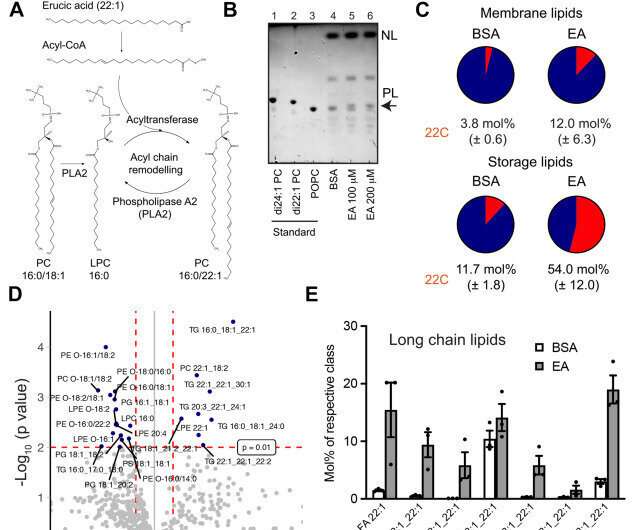Modulation of cell membrane influences formation of amyloid-β, finds study

Adding long-chain fatty acids can thicken cell membranes and alter the activity of a key enzyme, as LMU scientists have demonstrated in cell cultures.
A characteristic feature of Alzheimer’s disease are deposits of the amyloid-β protein, which clumps together to form plaques in the brain. The amyloid-β protein is produced by an enzyme which resides in cellular membranes. A team lead by Prof. Harald Steiner and Dr. Edgar Dawkins from the Biomedical Center Munich at LMU has now shown that the production of amyloid-β is influenced by the membrane thickness.
Cellular membranes consist of lipid bilayers. By externally adding further lipids, they can be thickened, which alters their properties. In earlier studies, Steiner’s team had already demonstrated in cell-free model systems that such changes affect the production of amyloid-β. This effect arises because the key enzyme for the production of amyloid-β, the so-called γ-secretase, is localized inside the membrane.
Remodeling in the cell membrane alters enzyme activity
Now the researchers have demonstrated that these fundamental mechanisms also apply in cells. To this end, they started out by developing methods for modifying the properties of living cell membranes in cell cultures. In this way, they were able to show that the addition of a long-chain fatty acid—a building block of the lipids—did in fact lead to remodeling in the cell membranes. This modulation of the membrane composition was also associated with changes in the activity of the γ-secretase.
The way in which this influenced the production of amyloid-β proved to be non-uniform: “Although our goal was to suppress the production of amyloid-β, we ascertained that the lipid treatments have complex effects on the production of this protein in biological systems,” reports Dawkins. “Depending on the genetic background of the cells we used, we were able to reduce or increase the quantities of amyloid-β.”
Long-term, the scientists see the potential in their results for delivering new impetuses to lipid-based treatment strategies for Alzheimer’s disease. “Our study contains important considerations in this regard, which researchers should look into when evaluating potential lipid-based approaches,” says Steiner, although he emphasizes that their practical implementation remains far off in the future.
The findings are published in the Journal of Biological Chemistry.
More information:
Edgar Dawkins et al, Membrane lipid remodeling modulates γ-secretase processivity, Journal of Biological Chemistry (2023). DOI: 10.1016/j.jbc.2023.103027
Citation:
Modulation of cell membrane influences formation of amyloid-β, finds study (2023, May 4)
retrieved 4 May 2023
from https://phys.org/news/2023-05-modulation-cell-membrane-formation-amyloid-.html
This document is subject to copyright. Apart from any fair dealing for the purpose of private study or research, no
part may be reproduced without the written permission. The content is provided for information purposes only.
For all the latest Science News Click Here
For the latest news and updates, follow us on Google News.

